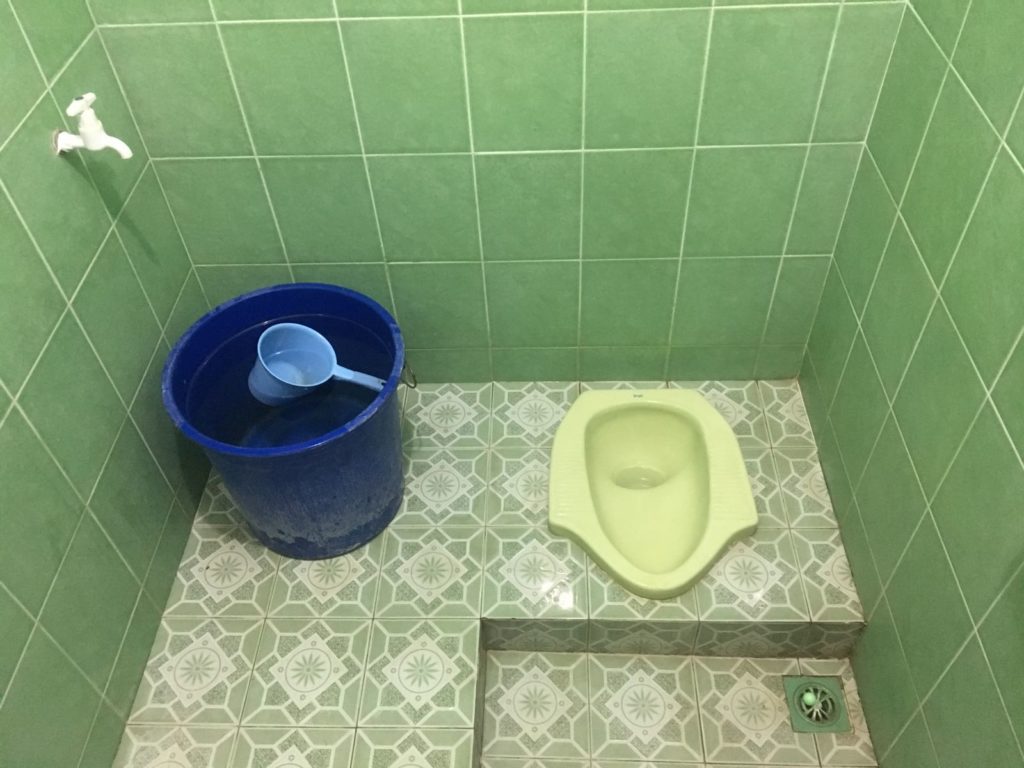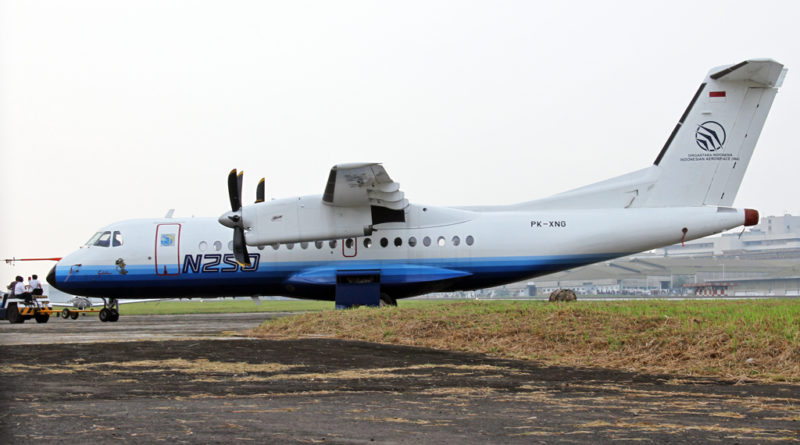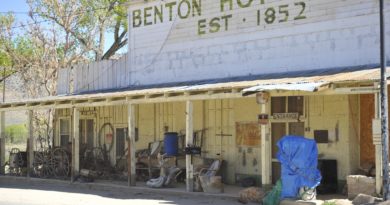Have Gun, Will Travel
Like the old TV Western, Have Gun, Will Travel, you do what you have to for a job. After being fired from NTP (see my post, “Into the Fire“), there were no jobs for a while. I spent the next few months as Mr. Mom while Janice worked full-time. Thank goodness being a Dental Hygienist paid well. Then I heard about an exciting opportunity in Indonesia working on the IPTN N250 turboprop. IPTN was trying to build an FAA-certifiable airplane it could sell worldwide. It was an ambitious goal for an emerging second-world country. Mel Strong, a long-time job shopper, got me connected to the right people at the temp agency placing engineers there. Getting people to go to Indonesia was not easy, so they were offering airfare, a $2,500 signing bonus and a pay rate of $50/hour. In 1990, that was good money. The idea of making that kind of money with tax advantages plus a foreign country adventure was too good to pass up. In Indonesia they were working 56-hour weeks with time-and-a-half and the first $70,000 was tax free if you stayed a year.
Confirmation for the job came and we spent the next couple weeks making all the arrangements. Janice got our house rented for the year and Mel and the guys agreed to help me find a house in Bandung. Indonesia pretty much ran on bribes and doling out favors. It was customary, and also smart, for foreigners to hire a housekeeper and a driver. Janice and I agreed I would fly over first and she would come about a week later with our two sons.
On the plane I made friends with a Brit who coincidentally was starting work at IPTN the same day. We stayed one night in Jakarta before flying to IPTN the next morning. Walking the streets was an adventure. I had seen the industriousness of Hong Kong, but Jakarta was filthy. I remember walking down a sidewalk that evening looking to cross the street when a voice caught my attention, seemingly at my feet. Looking down, there in the gutter was a man with no legs begging for change. I tried to withhold both my surprise and loathing, and kept on with my Brit acquaintance. He saw my expression, and having been to several developing Commonwealth nations, advised me strongly to keep away from the beggars. I understood later when I saw dozens of them come out of the woodwork and maul an ex-pat seconds after he gave a couple coins to a solitary panhandler.
From Jakarta we took a 75 mile leap of faith across the jungle to Bandung on a sorry, older IPTN-built plane. I was a whole lot less inspired for an adventure when I laid eyes on that thing. Nevertheless, it somehow defied the odds and got us there. I spent one night downtown before reporting to work and rooming with Mel and his buddies. But that didn’t stop one hotel shower from giving me an eye infection. After exchanging information about what design groups we would be working in, I said goodbye the next morning to my British comrade. He was a good man.
Day one at work brought the unexpected – no overtime. I asked a couple of the other shoppers what was going on. The answer was there’s no OT and don’t ask if you want to keep your job. I asked the group supervisor, and American-schooled Indonesian engineer, about the overtime and was pretty much told the same thing. I asked if a transfer was possible – no, and don’t ask again. So I spent a few days sniffing around the other groups trying to wrangle my way in and also got nothing.
A tour of the factory did nothing to help my confidence. Most of the huge buildings were vacant with a few old manufacturing machines randomly spaced about and just as few workers bending brackets by hand-working the aluminum with a hammer and anvil. Holy Crap! Talk about Neanderthal tooling practices. Realizing the plane I flew there on was probably built that way only cemented my anxiety about it.
Still, I was hopeful of making it work, and Mel volunteered to help me find family housing. So after work we headed to his place. It was big, fully walled and up on the hill. Sparsely branched tropical trees surrounded the curving sidewall entrance. Following Mel and dragging my suitcase, I immediately noticed something disturbing in those trees – spiders the size of your hand. Their webs looked like fuzzy, worn kite string. As I warily walked beneath them, I asked Mel, “What do those guys eat?” I was hoping people weren’t on the list.
He didn’t even glance up; he knew exactly what I was asking about. “Birds,” he said.
Holy shit! Now I understood the kite string webbing. I glanced up again, not feeling much more comfortable with the answer.
Mel shared the house with another American shopper and their Indonesian mistresses. Pretty girls who would do almost anything to escape the poverty down the hill and possibly convince a naïve American to take her back to the States. It was also an education in third world economics – it was understood ex-pats would support the locals by hiring a driver, housekeeper, and a cook; it was a kind of symbiotic relationship. I quickly learned these homes were all compounds with ten-foot walls to keep out the snakes and other wild things. I later saw a vivid example when we observed a huge cobra slithering down the middle of the street with his head three feet in the air.
Anything with indoor plumbing was special. The bathroom at IPTN engineering was an interesting example. Mel had told me to be sure and bring my own toilet paper, and when I visited the restroom I knew why. There was either a porcelain border surrounding an open hole or an ‘American’-style toilet. I felt obliged to check out the toilet, as it seemed it was missing a couple of essential visual cues. For starters, there was no flush handle. Closer inspection revealed no flush valve guts in the tank. Then I began to notice and understand the other clues. Next to the commode was a hose spigot over a bucket, with a ladle and a small rock beside it. The full picture then came into view: the idea was you did your business, used the rock in your left hand to wipe any chunks off you, then ladled water into the bowl until it ‘flushed.’ It was plain to understand why Muslims were insulted if you offered anything with your left, or ‘dirty,’ hand. While Indonesia practices a more liberal form of Islam, the fact I was left-handed still drew stares in the engineering office.

A few days later Mel and his buddy, along with the girls, took me to the natural hot springs up the slope of the local active volcano. The drive up through the tea fields was incredibly beautiful, and we spent the day there with the rest of the Indonesian upper crust. But we never drove ourselves. Driving was generally a bad idea for any non-Muslim because they still practiced an eye-for-an-eye justice. While I was there, we heard of a Brit ex-pat who had been pulled from his car by passersby after he hit and injured a pedestrian. They proceeded to beat him to death in front of his horrified family.
I finally had to call Janice and tell her not to come, that there was no overtime and without it we couldn’t make this work financially. I had spoken several times to a bunch of guys, and two of them finally confided there was never going to be any overtime because the Indonesian director for our design group was skimming the OT budget. I loved corrupt countries. It made me really appreciate the rule of law.
It was a lesson I would keep with me when others wanted to off-load work and know-how to China, or anywhere in Asia for that matter. Between Hong Kong and Indonesia I learned there was no honor in business, and many of them were thieves in one way or another. Bribes didn’t ensure anything. It became apparent the guaranteed cost & quality of a U.S.-built product was much less risky than the unknown costs of rip-off artists and shysters. Manufacturing to a specification and process meant nothing in Asia. They would use whatever cheap material they had available and certify it met your specification. You only found out you were screwed when it failed to perform. Then, good luck getting any compensation or correction from the other side of the ocean.
In the meantime, Janice had to do some scrambling. She had quit her job as a Dental Hygienist and had already leased our house out for the year. Somehow, she managed to cancel the lease and get another job. It was a good thing Hygienists were in demand, but I’m still not sure how she managed it all.
I spent the next week waiting for the $3,500 in bonus and travel reimbursement to hit my local bank account. It was time to escape with what I could grab and come home. I told Mel the whole situation and that I was bailing. Not much he could say. I arranged to catch the British Airways flight out of Jakarta and waited ’til mid-day to escape to the bank, clean out the account and lite out for the Bandung airport.
It was there I made a slight miscalculation that almost cost me. When I deplaned from that decrepit old Merpati Airline turboprop after its merciful landing in Jakarta, I looked around the terminal and got a sudden sickening twinge in the pit of my stomach – I was at the wrong airport. I had less than an hour to get all the way across town to the international airport and catch my British Airways 747 out of there. I ran up to a taxi and told the driver, “There’s 50,000 rupiah in it for you if you get me to Soekarno-Hatta International in 30 minutes!”
Man, we tore out of there like a shot. That little 4-banger Mitsubishi ran like a raped ape across town for its $25 payday. Along the way we passed a community bus on the freeway. People were hanging all over it, even outside the open doors. It was probably doing 70 as we flew by flat out doing about 95, that little car givin’ it everything she had. I made the airport, went running up to the ticket counter where the agent looked up and calmly said with flawless British inflection, “Mr. Morgan, we’ve been waiting for you.”
She hadn’t even looked at my ticket. They grabbed my bags and hustled me off to the gate, where the purser also greeted me by name and escorted me down the jet way. The door had closed before I even made it down the aisle.
*I usually change the names of co-workers and others to protect the innocent and shelter myself from litigation-happy jerks.




